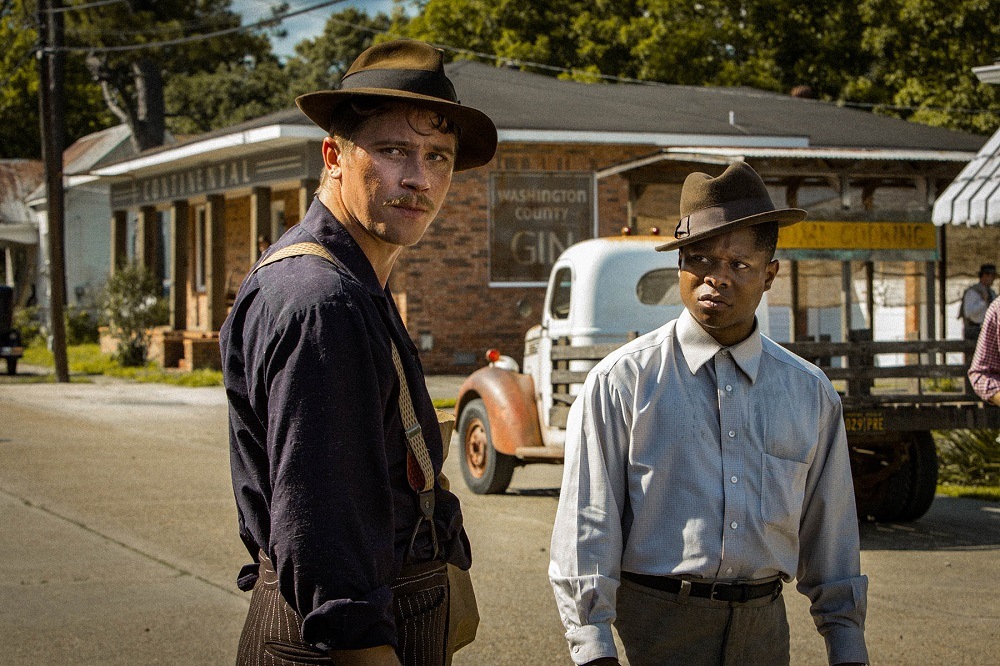
Anyone who saw Dee Rees 2009 debut film “Pariah,” knew she had a great future ahead of her, and she proved that with HBO’s “Bessie.” Now she’s outdone herself with her latest “Mudbound,” which was a tall order to put her literary stamp on such dense material.
For anyone who’s read the book, you’ll understand the massive undertaking Rees had, but she mightily pulled it off by giving the story a lot of room to breathe slowly with intensity until hitting it’s devastating ending. This is a film that you’ll be talking about with friends for several days after seeing it, but oddly, it hasn’t picked up distribution yet. If it doesn’t, it’s a sad state of the film industry when something this great doesn’t get the recognition it truly deserves.
If nothing else, this will be a real Oscar contender.
Director Dee Rees wanted to get to the big questions in her enthralling period epic “Mudbound.” Specifically: What is it to be a citizen and what is it to fight for a country that doesn’t fight for you? The film, which premiered Saturday night at the Sundance Film Festival, had audiences raving and some already speculating about Oscar chances.
Based on Hillary Jordan’s 2008 novel “Mudbound,” chronicles the lives of two families in the WWII-era South – one white and one black, and the complicated intersectionality of their paths. There’s the McAllans, Laura (Carey Mulligan), her husband Henry (Jason Clarke), his brother Jamie (Garrett Hedlund) and their father Pappy (Jonathan Banks), and the Jacksons, Florence (Mary J. Blige), her husband Hap (Rob Morgan) and their son Ronsel (Jason Mitchell).
They’re tied together by a rental agreement – the Jackson’s rent their land and home from the McAllans – and the deeply complicated racial relationships in the segregated South in which Henry can demand help from Hap at any moment and Pappy can insist that Ronsel exit the local store from the back entrance.
It’s a sprawling and deeply American story about women, men, race and personhood that defies a simple summary.
“It’s not didactic; it’s not preachy,” Rees said. “The thing I love about it is it’s multiple points of view.”
Both Jamie and Ronsel go off to fight in WWII, where Jamie’s once shiny life becomes clouded by the horrors of war and alcohol. Ronsel finds freedom and acceptance that he’d never had in the U.S. embodied in his appointment to Sergeant status and a relationship with a German girl. But back at home, nothing has changed.
“I wanted to juxtapose the battle at home versus the battle abroad with the battle at home sometimes being even bloodier than the battle abroad – to show these two families fighting on the front lines,” Rees said, whose grandfathers both fought in wars, one in WWII and one in Korea.
“Both went away and came back and both didn’t quite get what they should have gotten,” she said.
Rees, who directed “Pariah” and the HBO movie “Bessie,” found in the story a deep resonance with her grandmother too. She integrated images and truths from her grandmother’s life in the Louisiana into the story, like how she wanted to be a stenographer and not a sharecropper (one of the Jackson children declares this her dream) and how she remembered as a child being pulled on the back of a cotton sack.
Blige, who is earning raves for her subtle and deeply powerful performance as the Jackson family matriarch, also had a grandmother who grew up in the South in Savannah, Georgia. She channeled her to embody Florence.
“She was so strong and silent. She never really said a lot, but when she said something it meant something … She planted her own food, she killed her own chickens, she killed her own cows. (She) and my grandfather were Hap and Florence,” Blige said. “Southern people are really all about love, and that’s what I took. I’m born and raised in the Bronx in New York, and as a child I went down South every summer, so I saw my grandmother give love. I was raised with ‘yes ma’am’ and ‘no ma’am.’ ”
Though it’s been less than a day, so far the response has been rapturous. The audience at the premiere gave Rees and the cast a long standing ovation, and subsequent screenings have elicited similar praise. “Mudbound” does not yet have distribution, but it is expected to be one of the Festival’s hottest properties, and, one that people will be talking about long after Sundance comes to a close.

